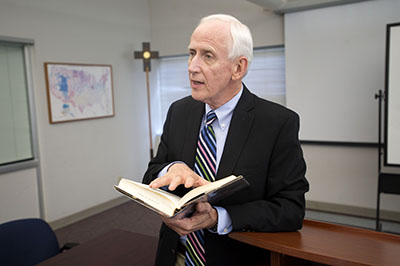 Menu
Menu

Affiliate Assistant Professor of Theology Dan Luby, S.T.L., S.T.D., has taught at the University of Dallas since 1980. After 36 years of dedicated instruction and service, Luby reflects on how education has changed in his time at UD — and how education in ministry thrives with these changes.
What has kept drawing you in during your impressive teaching career?
DL: The thing I find most compelling about this work is the opportunity to be able to listen to stories of people’s faith that are so concrete and real and so evidential, so persuasive about God’s presence in the world. To have the opportunity to be in the room when that happens is just a real gift.
It’s a gift that surely keeps on giving in both your life and the lives of your students.
DL: My deepest conviction about teaching is that if it — when it — works, it makes a connection to people’s lives. I always tell my students that the great theological question is, “So what?” If people are not able to make that connection, it can become a kind of abstract exercise that’s unrelated to their lives. I think that’s the perennial spiritual temptation. Theology and ministry formation at their best are ways to help people enrich their faith for the worship of God and the sanctification of his people.
You get to see students make those connections right before your eyes.
DL: I get to see that all the time. Sometimes I see it in a classroom, sometimes on a computer screen.
What connections have you seen people draw in the online courses?
DL: I was reading a student post in one of my the online classes, and the student told an amazing story about her experience with medical hardships and healing that were not only moving and full of grace but also perfectly apt for the Christological reflection I had asked them to connect to.
Pope Francis has called the internet a “gift from God.” How do you think the Neuhoff School of Ministry reflects this?
DL: In some ways, education is more exciting when it’s through technology, in spite of the fact that I’ve been teaching online for 10 years, because it’s unexpected. I expect it in the classroom. I’m still sort of surprised when it happens on a computer screen, but I can witness the impact it has on students who are all over the country. There can be a student who lives in Central Texas, being responded to by a student from Arkansas and a student from New Jersey and a student on the West Coast. I am literally watching the Gospel expand. That’s pretty exciting.
What are your hopes for when a student finishes one of your courses or programs?
DL: In general, my hope would be that the student would leave more convinced of God’s love and mercy and presence than they were when they came in, and that that conviction would bear fruit in doing the Gospel, whether that be in some kind of professional capacity in ministry or just as a rank-and-file member of the church. Those are the things that I would really hope for: that their faith would be enriched, and that almost by definition, if their faith is authentically enriched, it’s going to bear fruit in service.
What have you found to be most special about the Neuhoff School of Ministry in particular?
DL: It’s cliché to say that it’s about the people — but it is. Our faculty brings a lot of on-the-ground pastoral experience informed by high-quality theological education and scholarly practice. We have a really good blend and a strong connection to the work that people are hoping to do. Frankly, we do a really good job of embodying the values that we try to communicate. I love the image of accompaniment that Pope Francis talks about in his exhortation “The Joy of the Gospel.” I think we do that well. That’s something that characterizes our approach: that accompaniment is an important value.
What makes the Neuhoff School of Ministry so dynamic?
DL: The community of the school includes this three-pronged orientation of service with academic education, continuing education and the ministry conference, working closely with the local church. Those things rub off on and enrich each other. All of us are consultants to one another about various things, and we utilize people’s expertise from one area to another. Collaboration is a really important value for the church and for our ministry.
You aren’t just the gas station who fuels people up, and they go away. You’re Triple A, and you go help people. You pick up hitchhikers.
DL: There’s a sense of community that we experience within the faculty and staff that extends to students. I don’t know what it’s like in other departments. We have a small number of undergraduate majors, but they’re here all the time. We try to foster pastoral practitioners in action. Things like our Pancake Lunch and the Cajun Dinner are features of the way we operate that are significant, that are more integrated than I think they might be in some other context.